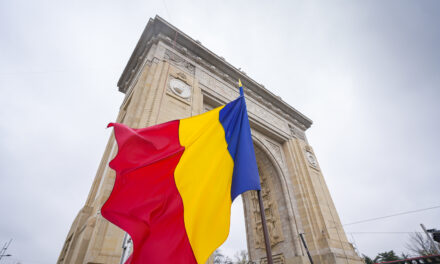Between 1994 and 1998, the temporary globalist brigade in our country was huge. Not only did he slip away without a trace the embezzled amount of twenty billion dollars that had leaked out of the MNB since 1973, but he also sold off the country's productive assets for a pittance.
It needs to be clarified how blindness is understood in financial matters. No different than usual. Something is in front of a person's eyes in broad daylight, but he cannot see it, even though he is not blind, he usually sees well. Loss of eyesight can also be caused by strong sunlight or light rays reflected from snow. The point is that we temporarily lose the orientation provided by our vision.
It is no different in financial matters, something can be in front of our nose for decades, yet we do not recognize its reality, or we do not see anything, or something other than what is in front of our nose. Modern finance has many aspects that are very difficult for the lay audience to understand. To interpret these, the help of specialists must be used, who either faithfully reproduce the phenomena they saw and experienced, or falsely, at all. In the latter cases, we can talk about mass losses in the field of finance as well. This is vulgarly called peasant blindness.
During the years of communism, the public did not know anything about the finances of the state, not even its staunchly loyal and organized squads, including most of the leaders of the state party, only the truly initiated. The country's finances were a strict state secret, everything remained hidden. Ignorance did not even require abnormal vision. We have only known about the existence of bacteria and viruses since the pioneer explorers informed us of this and developed defenses against them. Until then, many people fell ill and lost their lives. Spectacular public financial ignorance is fueled by the fact that those in the know tell the public that what they see is not in accordance with reality or even contrary to reality.
In my article, we are not referring to the minor or major financial frauds that took place in the relevant period - 1973-2010 - which largely remained without consequences even when the legal framework would have allowed for accountability. The frauds are dwarfed as an insignificant episode next to two series of eye-popping financial operations, with the help of which internationalist globalism slipped into another phase, liberal market globalism, in order to follow the principle of maximizing the share of the value produced in the country to its foreign partners for a long time to come.
In the mid-seventies of the last century, in the international workshops of globalism, the decision was made that the globalist end goal cannot be achieved on an internationalist basis, and that a transition to market-type globalism is necessary.
The preparations also hinted at this in the international financial system, such as the devaluation of the dollar and the still "temporary" interruption of the mandatory redemption relationship with gold. Deprived of its gold base, it gained maximum flexibility in the formation of its interest rate and exchange rate, became an internationalized private world money, and then the dollar launched its final attack, which continues to this day, to absorb the share available to the world. Our country participated in this process as a target for integration from the very beginning.
In order to achieve the goal, the country's indebtedness served as a means. Nothing is more typical than the fact that on the fiftieth anniversary of the foundation of the Magyar Nemzeti Bank, in 1974, it already took out the first hundred million dollar loan from the international money market. According to the official statement, the money was used to modernize the economy. The president of the bank at the time, Andor László, who also had an accurate picture of the economy and tried to warn about the difficulties of later repayments, was immediately retired , even though he enjoyed an excellent professional reputation and good health. Here is the obvious fact that a very initiated narrow circle already "knew, because - and even then - did" their work.
The target date known today as system change, 1990, was no obstacle for the globalist financial blinders, they continued the same as before, until 1997. The MNB continued to take out loans abroad. It took a high degree of insider complicity in order for no domestic body to force the disclosure, with the central bank also applying the international accounting system that had already become common practice in our country at that time, on the basis of which the accumulated terrible losses should have been revealed immediately .
then central bank president Ákos Péter Bod , the star economist professor who has now officially transferred to the globalists, Knowing him, this is not surprising. The loans were not used to develop the economy, or even to finance the maintenance of living standards, which was often repeated as a mantra, but new and new loans covered the growing exchange rate losses and accumulated interest.
At my request in 1998, the two ÁSZ vice-presidents who came to our parliamentary group clearly stated that they had no way of investigating whether the state coffers had used the money borrowed by the MNB, and if so, how much and for what purpose. Therefore, the usual mandatory auditor countersignature was not given for the operation either. Even in the absence of this, the more than two-thirds majority legalized the operation, calling it a debt swap.
The state thus accumulated a debt of more than twenty billion dollars without using a single cent of it for economic development, nor for improving the standard of living. The Hungarians ensured their own standard of living with a self-exploiting lifestyle. Unlike Rákosi, Kádár already made it possible to have second and third jobs, two-person households, and backyard farming. The silence about the case is painful to this day, no one refutes it, or even talks about it, neither in professional, scientific, nor public circles. The case is taboo, some of the perpetrators who are still alive are still star money jugglers.
During the government period between 1994 and 1998, the globalist brigade created a huge force in our country. Not only did he slip away without a trace the embezzled amount of twenty billion dollars that had leaked out of the MNB since 1973, but he also sold the country's productive assets for a pittance. Today, the market value of OTP or Mol is a multiple of the total privatization income.
Despite their best efforts - although there were many attempts - these national family silvers were saved. During the four years of the national government between 1988 and 2002, the globalists relaxed and swept away the hosannas of the Western financial world. Bokrost and Surányi were called a dream couple, and they were also preparing for the next dazzling attack, which could start soon. After the acquisition of the state's productive assets and the repeated chronic indebtedness of the state, the goal became the acquisition of the assets of domestic households and businesses.
The preparation of the ground began already in 2003, when forint interest rates were once again in the sky, unaffordable for Hungarian companies and households. They came up with their hitherto uniquely fraudulent idea, the so-called currency-based loans. They consciously and purposefully misused their market knowledge and the fact that the affected target audience lacked it. They recommended that he take out a HUF loan, but with the same interest rates as in the case of foreign currencies.
In fact, the interest rates were always higher than this, even though they are orders of magnitude lower than real HUF loans. There was not a single meaningful mention of the fact that the relevant target currency will strengthen lawfully and significantly against the forint during the term, as it always did in the previous four decades, always over a period of a few years. The disaster bankrupted ten thousand people who took out foreign currency loans for their apartments . Many entrepreneurs were also affected by the wave of bankruptcy, as they also took advantage of the "excellent" loans, and most of them were responsible for the debts not only with their business assets, but also with their personal assets.
The banks operating in our country at that time were, with few exceptions, foreign-owned, they were only able to do all these tricks with the active participation of the domestic cooperating globalist team , including the globalist experts of the central bank and the Ministry of Finance.
The legalization of the eye-popping foreign exchange loan fraud did not require the approval of the Audit Office, nor did it require a parliamentary seal. For the foreign currency loan case, it was enough that the highest domestic legal forums always nodded in agreement, even though lower judicial forums sometimes saw the point in their judgments. There were cases where the contract between the parties did not mention currency, yet the highest legal forum saw a foreign currency loan instead of HUF.
There are some additional characteristic, very destructive elements of domestic foreign currency lending. , which accounts for one percent of the EU's GDP, issued more than ten percent of all foreign currency loans. In several countries, loans granted in the domestic currency were downgraded to domestic currency, but this was out of the question for us.
In 2010, the government took over the country without state productive assets, with a dilapidated domestic business class and with households up to their necks in debt and adopted an economic policy labeled as unorthodox. Low interest rates, moderate inflation, increasing employment, and a huge recovery in all spheres of society, as in the case of, for example, sharply rising medical wages.
Now the time has come for the domestic globalists to return to the well-trodden orthodox path and make the country bald again. Next spring, it will be clear whether the voters will let him.
Imre Boros is an economist
(Cover photo: Tibor Vermes/Demokrata)












